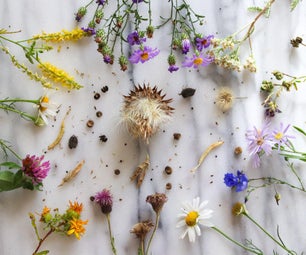Introduction: Mushroom Plant Pots With Stands
In this Instructable I made plant pots using Ecovative'sGIY materials and put them on decorative stands. The skill required to make the plant pots is easy. The wooden down stands require using at least a miter or hand saw and I used a table saw as well. Here are the materials and tools I used:
Materials:
- 1 x bag GIY material.
- 1 x 5/8" wooden dowel (your choice of wood)
- 1 x ball of chalk line string
- Eco-friendly wood glue or other sealant
Tools:
- Mixing bowl (or other round form)
- Pencil & Scissors
- Ruler / Tape Measure
- Miter / Hand Saw
- Table Saw / Lathe (Optional - for scoring)
As always, please feel free to reach out to me if you have any questions!
Step 1: Form the Bowls
Here I re-hydrated the GIY material and then put it into the forms. Follow the directions on the Ecovative website to get the material growing and ready for use.
- Re-hydrate the GIY bag
- Clean the mixing bowl and dry thoroughly
- Using gloves, press the material around the inside of the bowl leaving about 3/4" or more of material at all points.
- Cover the bowl with Seran wrap or a cover if your mixing bowl has one.
- Poke several holes in the top of the lid or wrap for the Mushrooms to breath
- Grow for 4 days.
Pro tip: Make sure your lid / cover is sealed very well and that you poke a few holes. This will ensure the material does not dry out during the four day growth.
Step 2: Make the Dowel Stands
While you wait for the GIY mushroom plant pots to grow, make the dowel stands. They are held together using some general purpose string, but it is best to use something that doesn't stretch too much. I used chalk line string because I like how it looks and it is very strong.
- I used 8" bowls, so I cut the dowels to 12"
- Score the dowel at the midpoint (or 6" for good leg stability) using a table saw or file to 1/8" depth.
- Sand the ends of the dowels to remove splinters. I used a power sander, but just same sand paper will do.
Pro tip: Score the dowels at the ends and paint them for a little extra flair.
Step 3: Finish the Dowel Stands
Here I tied the dowel stands together. This part can be a little tricky, but using some trial and error is best. The string is cheap. I'll do my best to explain my best practice.
- Tie a slip knot / hitch loop (made up term?) at the end of the string.
- Place the loop over the first dowel score and tighten down
- Attach the second and third dowels by wrapping the string around each independently so that each dowel is attached to the center of all three and can rotate freely.
- Splay the three dowels out at an angle to which the bowl can fit and then wrap the string around the mid point so that it moves above and below the center point to hold the three dowels together.
- Use half-hitches to tie the string off. Use some super glue if necessary.
Pro-tip: Use the bowl itself to determine the last two steps.
Step 4: Secondary Growth Stage
In this step you remove the GIY plant pots from the bowl and grow them in the second growth stage to get the fluffy white outside finish.
- Remove the GIY material from the bowl (make sure it is grown together)
- Place inside a separate lidded container
- Seal the lid of the container (I used Seran wrap for mine)
- Grow for an additional 2-3 days or until the surface is saturated with white mycelium
Pro-tip 1: Use a small amount of compressed air around the edges of the plant pot and the bowl to release the GIY material.
Pro-tip 2: Don't let anything touch the sides of the plant pots during this step while they grow and they will achieve the best finish.
Step 5: Dry the Plant Pots
In this step you remove the plant pots from their growth environment and dry them in an oven or with a fan.
- Remove the GIY plant pots from the growth environment
- Dry with a fan OR place in the oven at 180F for 2-3 hours for best results.
Pro-tip: Be careful handling the pots until they are dry. Touching the wet material can leave fingerprints later.
Step 6: Optional: Seal the Plant Pots
This is an optional step, but just to be safe you can seal the inside of the plant pots using glue. GIY mycelium material is naturally hydrophobic and does a nice job repelling water, but the material is organic and compostable, so it will eventually soak up water if any holes or cracks appear in the surface.
- Using a paint brush apply a natural wood glue.
- Let dry for 24 hours.
Step 7: Plant the Pots and Enjoy!
Plant the pots. These do not have drain holes, so be careful with how much water you add and be sure to check frequently to make sure your plants are healthy.
If you have any questions please ask and experiment with different size pots and forms!













